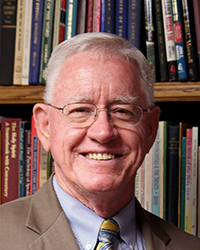

by Jim Deason
Synopsis: In the parlance of our agricultural past, Jim reminds us, "If you want to plow a straight furrow, you've got to keep your eye on the end of the row."
Alice in Wonderland is a novel published in 1865 by Charles Lutwidge Dodgson under the pseudonym, Lewis Carroll. Now over 150 years old, it has become a classic in the genre of children's literature. The story is about a girl who falls through a rabbit hole into a fantasy world inhabited by strange, peculiar creatures like the Mad Hatter, the Jabberwock, the Queen of Hearts, and the Cheshire Cat.
There's a conversation that takes place between Alice and the Cat that I want to share. Alice asked the Cat, "Would you tell me, please, which way I ought to walk from here?" "That depends a good deal on where you want to get to?," replied the Cat. Alice said, "I don't much care where," to which the Cat remarked, "then it doesn't matter which way you walk."
There are lots of people in our world—like Alice—who are looking for direction to an unknown destination. Because they have no real goals in life, they are wandering aimlessly, lost in the mass stream of humanity, and certainly lost to usefulness in the kingdom of Christ.
Solomon understood the importance of knowing where you want to go in life, and the importance of setting your mind toward that destination. He said,
My son, give attention to my words; Incline your ear to my sayings. Do not let them depart from your sight; Keep them in the midst of your heart. for they are life to those who find them and health to all their body. Watch over your heart with all diligence, for from it flow the springs of life. Put away from you a deceitful mouth and put devious speech far from you. Let your eyes look directly ahead and let your gaze be fixed straight in front of you. Watch the path of your feet and all your ways will be established. Do not turn to the right nor to the left; turn your foot from evil (Prov. 4:20-27).
Solomon advised his son to set a goal for himself and resolve to succeed in achieving that goal. "Watch the path of your feet and all your ways will be established" (Prov. 4:26). "The path the Lord guides us in is level and straight (4:11-12). The call is to keep your eyes upon it" (Kitchen). Goals are important to any successful endeavor in life, especially the goal of establishing our ways in the will of God.
Before you build a building, you need a blueprint. Large corporations have to plan—sometimes years in advance—for expansion and diversification, etc. They know that if they are not adaptable to the inevitable changes that take place in the corporate world, they will become irrelevant and go "belly up." Seneca said, "When a man does not know what harbor he is making for, no wind is the right wind."
When we attempt to work without plans or goals, our labors become listless and lethargic; we have nothing for which to strive, no measure of success, and no hope to sustain us. With the reward of attaining our goal before us, we are motivated to work diligently to obtain it.
Goals reflect priorities, and priorities control our time. A student sets educational goals, so he meets his class schedule. A man sets his goals in the marketplace, so he spends the time necessary to meet those goals. When you choose to follow Jesus, to be successful, you must give your schedule to the Lord (cf. Eph. 5:16).
One writer unknown to me said, "If you aim at nothing, you invariably hit it." This sounds eerily similar to what the Cheshire Cat said to Alice. If you don't know where you want to go, don't care where you go, it doesn't matter which path you take. On the other hand, unlike Alice, if you know where you want to go and what you want to accomplish, you can focus on the right path that leads to your destination.
I believe Solomon understood the importance of goals. Consider how often he used certain phrases within the book of Ecclesiastes: "I set my mind to seek" (1:13), "I set my mind to know" (1:17), and "I have seen and applied my mind to..." (8:9; cf. 2:12; 7:25; 8:16; 9:1).
Like Solomon, most folks have goals. They may not be stated nor necessarily intentional, but we often set our hearts on specific things. Wouldn't it be wonderful if we all, like Ezra, "Set (our) heart to study the law of the Lord and to practice it, and to teach His statutes and ordinances..." (Ezra 7:10). You need to, "Set your mind on the things above, not on the things that are on the earth..." (Col. 3:2) and, "Seek first His kingdom and His righteousness" (Matt. 6:33). Why? Because, "Where your treasure is, there your heart will be also" (Matt. 6:21).
Setting "your mind on the things above" (Col. 3:2), and recognizing that the gate that is small and the way is narrow (Matt. 7:13-14) will affect every aspect of your life. It will affect where you work, what you do, what kind of worker you will be. It will affect what you read, the songs you listen to, and the movies you watch. There is no area of life left untouched by your resolve to follow Jesus to heaven. If this sounds like a sacrifice, it is! Jesus said, "If anyone wishes to come after Me, he must deny himself, and take up his cross daily and follow Me" (Luke 9:23; cf. Rom 12:1-2).
Think about Joshua for a moment. After Moses' death, he was commissioned to lead Israel across the Jordan and into Canaan. He was promised victory, but there was a condition to his success, "Only be strong and very courageous; be careful to do according to all the law which Moses, My servant, commanded you; do not turn from it to the right or to the left, so that you will have success wherever you go" (Josh. 1:7).
Then God said, "Have I not commanded you? Be strong and courageous! Do not tremble or be dismayed, for the Lord your God is with you wherever you go" (Josh. 1:9). Gary Henry once wrote, "Godly goals are greater than any other because He is their object—and because He Himself is the help that will carry us where we need to go" (Word Points). The apostle Paul said, "To this end we always pray for you, that our God may make you worthy of his calling and may fulfill every resolve for good and every work of faith by his power" (2 Thess. 1:11, ESV).
So, follow the advice of Solomon, who said, "Let your eyes look directly ahead and let your gaze be fixed straight in front of you" (Prov. 4:25). Constantly keep your godly goals in front of you.
My uncle, Johnny Burton, taught me how to plow behind a mule. He kept reminding me, "Jim, if you want to plow a straight furrow, you've got to keep your eye on the end of the row." That's more than just a good philosophy of plowing, that's a good philosophy for life!
Brethren, I do not regard myself as having laid hold of it yet; but one thing I do: forgetting what lies behind and reaching forward to what lies ahead, I press on toward the goal for the prize of the upward call of God in Christ Jesus (Phil. 3:13-14).
Henry, Gary. "Godly Goals Are Always Greater." WordPoints. August 22, 2018. Accessed December 11, 2018. https://wordpoints.com/godly-goals-greater-august-26/.
Kitchen, John A. Proverbs: A Mentor Commentary. Christian Focus Publications, 2012.
Author Bio: Jim has worked with the South Cullman church in Cullman, AL. for more than twelve years. He and his wife, Paige, have three children and eleven grandchildren. The church website is southcullmanchurch.com. He can be reached at jhdeason@gmail.com.

